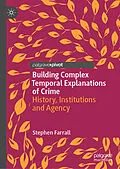A thoroughly engrossing invitation to criminologists to take history seriously. It is a compelling book, which casts a critical eye on complexity, continuity and change. Written with flair and imagination, it provides a bold, dynamic framework to challenge the existing parameters of criminological inquiry. Original, ambitious and thought provoking - this is an important and timely work.
Eamonn Carrabine, Professor of Criminology, Department of Sociology, University of Essex
A timely and refreshing read from start to finish. By offering complex answers to complex problems, Professor Farrall presents a compelling vision of criminology which is underpinned by interdisciplinarity, context, temporal processes and agency. Essential reading for anyone seeking to develop and challenge their own thinking around issues of crime.
Neil Chakraborti, Professor in Criminology, University of Leicester
Autorentext
Stephen Farrall is Research Chair in Criminology at the University of Derby, UK.
Zusammenfassung
This book seeks to bring understanding of both complexity and temporality into criminology. It outlines why these are important in criminological models of causation and explanation and explores them by drawing on theories and approaches in political science, comparative history, social theory and systems analyses. It discusses what is meant by complexity and introduces historical institutionalism (which is rarely used in criminology) to criminological audiences; it introduces what is known as 'why-because' analyses to the social sciences. This style of thinking is used to explore the causes of major transportation accidents (such as aeroplane or ferry disasters) and involves the integration of structural, organisational and agentic inputs in accounting for such disasters. Chapters on realistic evaluation, theories of structuration and agency, and research design and research methods are included with an example project based on the author's recent studies of Thatcherism which shows how these theories can be applied to empirical data. This book speaks to those interested in criminology, sociology, political science, research methods and the wider social sciences.
Inhalt
Introduction.- Chapter One: Recognising Complexity.- Chapter Two: Historical and Constructivist Institutionalisms.- Chapter Three: Why-Because Analyses.- Chapter Four: Realistic Evaluation.- Chapter Five: Where have All the People Gone? Theories of Structuration, Practice and Agency.- Chapter Six: Research Designs and Research Methods.- Chapter Seven: An Exemplar.- Chapter Eight: Concluding Observations.- Glossary.
